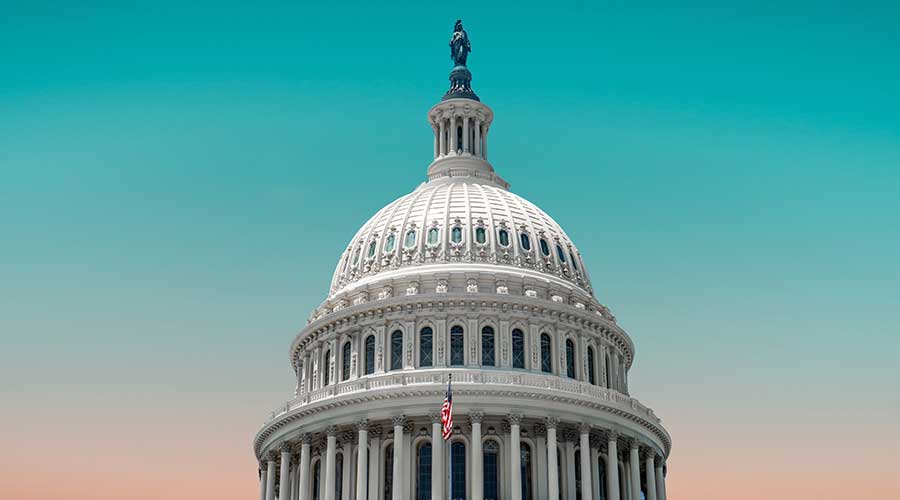Stay updated on news, articles and information for the rail industry
June 2017
Rail News: Amtrak
Trump budget presents 'dichotomy' for rail

By Julie Sneider, Senior Associate Editor
Unveiled last month, President Donald Trump’s proposed fiscal-year 2018 federal budget would reduce the U.S. Department of Transportation’s (USDOT) spending by 12.7 percent. On the chopping block: the Transportation Investment Generating Economic Recovery (TIGER) grant program, funding for Amtrak’s long-distance routes and the Capital Investment Grants (CIG) program, also known as New Starts.
CIG is the Federal Transit Administration’s (FTA) primary grant program for funding major capital transit investments, including those involving heavy, commuter and light rail, and streetcars. Trump proposes phasing out CIG funding. In FY2018, the program would receive $1.2 billion — about enough to fund all existing Full Funding Grant Agreements (FFGAs) and Caltrain’s electrification project.
The budget indicates that the FTA won’t be signing any new FFGAs, even for transit projects that received funds under the FY2017 omnibus appropriations bill, according to a budget analysis by the American Public Transportation Association (APTA).
Trump proposes zero funding for the TIGER program and no operating support for Amtrak’s long-distance routes. TIGER is a discretionary grant program that helps fund road, rail, transit and port projects that serve national objectives, according to the USDOT.
From 2009 to 2016, the department provided TIGER grants worth a combined $5.1 billion to 421 projects. The federal dollars leveraged money from private-sector partners, states, local governments, metropolitan planning organizations and transit agencies.
Moreover, the budget calls for reducing support for other intercity passenger-rail programs authorized by the Fixing America’s Surface Transportation (FAST) Act, APTA says. However, also consistent with the FAST Act, the budget does recommend the full $9.7 billion for FTA programs funded by the Highway Trust Fund’s Mass Transit Account, according to APTA.
A peek at the infrastructure plan
Trump’s budget also offered for the first time a more detailed look at his proposed $1 trillion infrastructure initiative, which calls for $200 billion in federal infrastructure outlays over 10 years — with $5 billion being made available in FY2018, according to a supplemental budget fact sheet.
The initiative covers improvements to surface transportation modes, airports, waterways, ports, drinking water and wastewater systems, and federal facilities, such as veterans hospitals. Federal funds would be leveraged to encourage non-federal investments. The proposal also recommends expanding eligibility for loans and increasing the subsidy amount under the Transportation Infrastructure Finance and Innovation Act (TIFIA), and expanding eligibility for tax-exempt financing under the USDOT Private Activity Bonds program.
Impact on rail?
For the rail industry, Trump’s budget and infrastructure initiative offer an “interesting dichotomy,” says Chuck Baker, president of the National Railroad Construction & Maintenance Association (NRC), which represents the interests of rail suppliers and contractors.
“The specifics of TIGER, New Starts and Amtrak are troubling,” Baker says. “All those proposals are bad for rail contractors.”
On the other hand, the infrastructure plan could bring encouraging news for rail projects and the contractors that work on them, he adds.
“What this [budget] means is that the NRC and groups like ours will be on Capitol Hill helping to make the case for why [TIGER, CIG and Amtrak] are worth the federal investment,” says Baker. “And, we’ll be working on getting an infrastructure bill through Congress and onto the president’s desk.”
Keywords
Browse articles on President Donald Trump fiscal-year 2018 budget U.S. Department of Transportation National Railroad Construction & Maintenance Association Chuck Baker TIGER Capital Investment Grants TIFIA American Public Transportation Association AmtrakContact Progressive Railroading editorial staff.


 LRW Honors Amtrak’s Acheson As Railway Woman Of The Year
LRW Honors Amtrak’s Acheson As Railway Woman Of The Year
 From Editor-In-Chief Foran: Of Gender Equity And Inclusion
From Editor-In-Chief Foran: Of Gender Equity And Inclusion
 Spotlight On Some Of Today’s Rail Safety Products
Spotlight On Some Of Today’s Rail Safety Products
 Women of Influence in Rail eBook
Women of Influence in Rail eBook
 railPrime
railPrime








